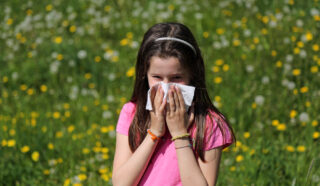
More Child Health and Safety Articles
Springtime Allergies: Exploring Holistic Options For Relief

As the earth awakens from its winter slumber, spring ushers in a symphony of blossoms, warmer temperatures, and outdoor adventures. However, for many children, this season also brings the unwelcome companionship of allergies, casting a shadow on their enjoyment of the great outdoors. While conventional medications offer relief, exploring holistic options can provide children with natural alternatives for managing springtime allergies.
Understanding Spring Allergies
Spring allergies, commonly known as hay fever or allergic rhinitis, occur when the immune system reacts to pollen from trees, grasses, and weeds. For children sensitive to these allergens, exposure can lead to symptoms such as sneezing, nasal congestion, itchy eyes, and coughing. While medications like antihistamines and nasal sprays are effective in alleviating symptoms, some parents seek holistic approaches that address the root cause of allergies.
Holistic Options For Allergy Relief
- Proper Nutrition: A balanced diet rich in fruits, vegetables, and whole grains can support the immune system and reduce the severity of allergic reactions. Foods high in vitamin C, such as oranges and strawberries, possess natural antihistamine properties, while omega-3 fatty acids found in fish can help reduce inflammation.
- Herbal Remedies: Certain herbs and botanicals have been traditionally used to alleviate allergy symptoms. Butterbur, for example, is believed to have anti-inflammatory properties that can ease nasal congestion and sneezing. Similarly, stinging nettle has been shown to relieve allergy symptoms by inhibiting the release of histamines.
- Acupuncture: This ancient Chinese practice involves inserting thin needles into specific points on the body to restore balance and promote healing. Some studies suggest that acupuncture may help alleviate allergy symptoms by modulating the immune response and reducing inflammation.
- Probiotics: The balance of gut bacteria plays a crucial role in immune function, and probiotics can help maintain a healthy microbial environment. Research indicates that probiotic supplements may reduce the severity of allergy symptoms by modulating the immune system’s response to allergens.
- Nasal Irrigation: Saline nasal irrigation, using a neti pot or saline spray, can help flush out allergens and mucus from the nasal passages, providing relief from congestion and irritation. This simple yet effective technique can be safely used in children with allergies.
Holistic Care and Allergy Prevention
In addition to addressing allergy symptoms, holistic approaches focus on strengthening the body’s natural defenses and reducing overall allergic reactivity. Encouraging outdoor play during times of low pollen counts, practicing mindfulness and stress-reducing activities, and ensuring adequate hydration are all integral components of holistic allergy care for children.
Spring allergies need not dampen a child’s enthusiasm for the season’s delights. By exploring holistic options for allergy relief and prevention, parents can empower their children to enjoy the wonders of springtime while fostering overall health and well-being. Whether through dietary modifications, herbal remedies, or mind-body practices, holistic approaches offer natural and effective alternatives for managing spring allergies in children, allowing them to thrive amidst the blooming beauty of the season.
Other Articles You May Find of Interest...
- Rest Easy: How a Custom Bedwetting Program Can Change Your Child’s Life
- Newborn Physicals In the Comfort Of Your Home
- A Complete Guide To Preparing Your Child For An Urgent Care Visit
- Nurturing Healthy Sleep Habits in Infants and Toddlers
- Tackling Education Staffing Challenges in Modern Schools
- Could Your Child Have Head Lice?
- Children Need Cheerleaders

















